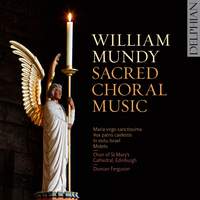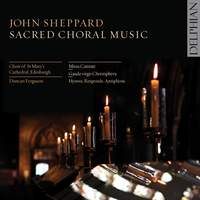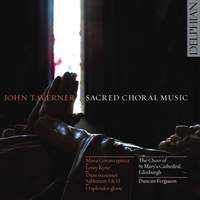Interview,
Duncan Ferguson on William Mundy
 The choir of St Mary's Cathedral, Edinburgh have been making something of a name for themselves in recent years, with a string of polished and well-received choral releases on the Scottish label Delphian ranging from early music up to living composers, by way of Bruckner, Stravinsky and others.
The choir of St Mary's Cathedral, Edinburgh have been making something of a name for themselves in recent years, with a string of polished and well-received choral releases on the Scottish label Delphian ranging from early music up to living composers, by way of Bruckner, Stravinsky and others.
Their latest release takes them slightly off the beaten track, to the output of William Mundy - a doyen of choral music in his time, whose monumental and extensive works were praised by his contemporaries and held in equal esteem to those of Byrd or Tallis. I asked Duncan about this ambitious album, and how he sees Mundy in the wider context of the English choral tradition.
The choir’s previous Renaissance discs have focused on better-known composers such as Taverner and to an extent Sheppard. Where did the impetus come from to devote an entire disc to the more obscure Mundy?
The choir has enjoyed recording Latin music from mid-sixteenth century England before, and in the case of the Sheppard disc it was good having the opportunity to record some previously unrecorded works. Mundy’s music is truly at the centre of the religious changes taking place in England in the sixteenth century and there are also several unrecorded or lesser-known works that deserve to be performed and heard, so it seemed the natural choice after Sheppard (via our Stravinsky disc!). It was a happy coincidence that Magnus Williamson at the Tudor Partbooks Project was looking at Mundy’s music just at the same time as us, and we agreed to begin the project around his reconstruction of Maria virgo sanctissima, Mundy’s ‘other’ great but unrecorded Marian antiphon (we couldn’t miss out Vox Patris of course!).
Your notes make mention of political subtexts to some of these works – certainly these times were known for dual meanings hidden in plain sight in the music of religious loyalists. Do you think the flourishing of Marian devotional works under the Catholic Queen Mary is more than just a happy coincidence arising from her name?
I think it’s fair to say that there were sound religious reasons why Marian works were back in vogue with the return to Catholicism under Queen Mary in 1553. Musicians wrote music that was devoted to the Blessed Virgin Mary, but they also turned to writing other works required by the Catholic liturgy: this musical provision was an essential part of the Catholic ritual, music being every much as part of the sensory experience of going to church as the great processions, incense and images (all absent during the preceding Edwardine Protestant period). I'm sure that the combination of religious and political reasons - honouring the mother of Jesus in music and underscoring the new Queen's legitimacy as monarch - presented an opportunity too good for composers to miss. Both Vox Patris and Maria virgo sanctissima seem to fall into this category.
The collaborative work In exitu Israel, written jointly by Mundy, Byrd and Sheppard, jumps out as being distinct from the others. Can a listener with a reasonable familiarity with music of this period expect to spot their different personal styles in the different sections (and does this add to the work or detract from it)?
We recorded the work in procession with trebles singing the plainsong verses and tenors and basses the polyphonic sections (In exitu Israel is an Eastertide Vespers procession to the font). The procession element, with the verses getting gradually more ‘present’, hopefully conveys a sense of unity even though the work was written by three composers. The composers seemed to have written the piece intentionally to be sung ‘as one’, so it does hold together well: it isn’t as though three different pieces have been awkwardly stuck together to make a whole. How the actual compositional process took place is hard to know, of course, but it’s rather fun spotting individual compositional quirks: Mundy’s verses take the Medius part to a top A, whereas the others don’t go higher than a G. William Byrd, very much the youngest of the three composers, was probably trying to impress Sheppard with his ability to write in the elder composer’s style but also with his own invention: he sets verse 18 to a canon between the upper voices. The psalm is a long one, and while not detracting from the piece’s integrity, perhaps it being the work of three different composers helps to maintain and enhance the musical interest.
It’s been suggested that Mundy’s ability to move with the times and forge a new style in English, suiting Elizabethan tastes, may have helped to save the English choral tradition from borderline extinction by Protestant iconoclasts. Do you think this rather romantic notion (one thinks of the similar mythology surrounding Palestrina’s Missa Papae Marcelli and Pope Pius IV) holds up?
Looking back at that time, there is little doubt that contemporaries must have wondered if music would continue to have a place in the English church. With the benefit of hindsight, my personal view is that the place of music in the pre-Reformation English church was so significant (and people’s attachment to it so strong) that it was unlikely to go away entirely. Music is too powerful a medium to be as destructible as that, and I think it always had a chance, at least, of survival. Composers certainly played a crucial part in proving it could work for the new church, though, and there is no doubt that Mundy and a few others in those early years of Elizabeth’s Church of England were vital in doing this. It is quite remarkable to think it only took a few years of forging a new ‘English church music’ before very artistic forms such as the verse anthems and services (and even the Great Services) were being written in a new style that adopted certain Protestant ideals but also proved the place of music (even elaborate music) in the new church.
This music is, to put it mildly, different from much of the repertoire that sees regular use by cathedral and collegiate choirs in the British Isles, and it’s probably fair to say it’s not immediately accessible to the singer in the way that Edwardian or later works might be. How did your younger singers engage with such a heavy-duty programme of extensive and complex works?
I think it’s important to remember that this music was written for choirs in which children sang: it wasn’t written for adult sopranos or concert choirs. These days I think both types of choirs can produce their own different but equally valid interpretations, but I wonder if the music is rather more easily accessible for young choristers than we might at first think. If one considers English repertoire up to the 1540s and, in the case of Mundy and some others, in the Marian period, one of the most distinct things about it is the florid, melismatic lines of festal compositions. It is in the treble part that these lines are most extended, almost containing an improvised feel.
When we start to learn this sort of music in a morning rehearsal I sense that the choristers just naturally tune in to that sound world. We don’t talk about the music’s history or style until we’ve learnt a good chunk of the notes: it’s living, breathing music, not a museum piece, and I think there’s a danger that the music can be approached too carefully. When you do that, or have a pre-conceived idea of how the music should sound, it makes it much more challenging for the performers. Much of the music needs a sense of freedom and fearlessness. I’m not sure if it’s quite the same as much later music, particularly music from the Victorian or Edwardian period, where you do need to observe what the composer has told you to do! There is also a big difference between the approach to one of Mundy’s festal compositions and a concise Elizabethan motet, of course. In the sound world of Mundy, however, I believe the collective experience of daily liturgical singing from a cathedral or collegiate choir helps us with music written even as long ago as the 1550s. You approach it personally and distinctively, knowing the composer’s spiritual purpose. With Mundy you decide on the tempo, the dynamics, and where each phrase is heading. Lots of power rests with the performers. I think that appeals to the whole team.
William Mundy: Sacred Choral Music was released on Delphian on 22nd June.
Available Formats: CD, MP3, FLAC, Hi-Res FLAC, Hi-Res FLAC
2014 saw the choir take on the often intricate music of John Sheppard - another composer forced by circumstance to adapt his style to a fast-changing religious landscape.
Available Formats: CD, MP3, FLAC, Hi-Res FLAC
The choir's first foray into early repertoire on Delphian, released in January 2010, won critical acclaim for its authenticity and freshness.
Available Formats: CD, MP3, FLAC





